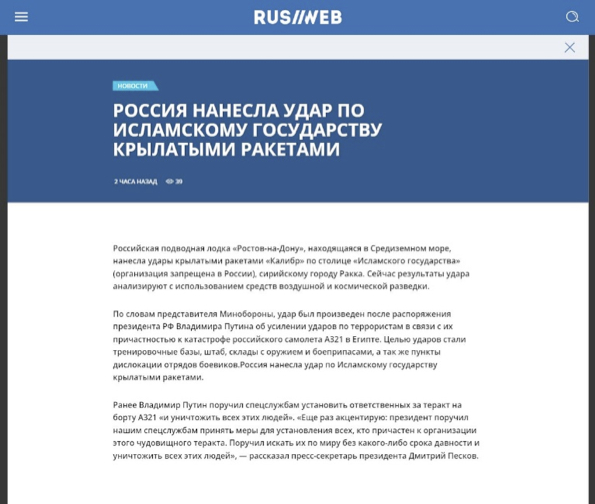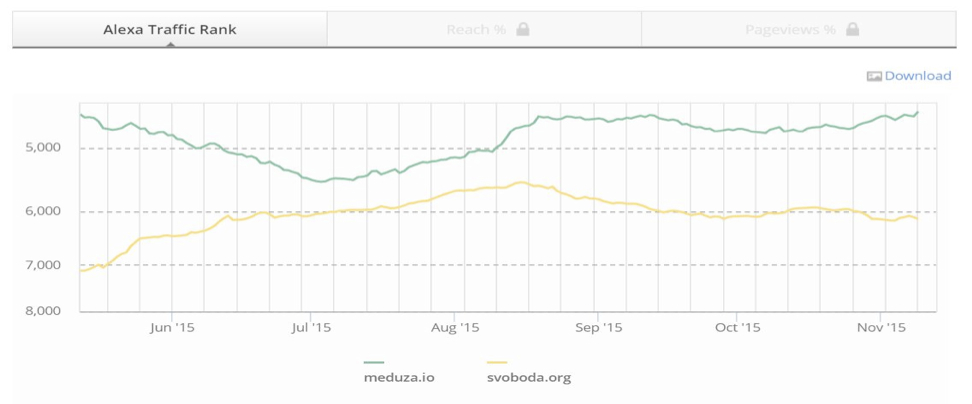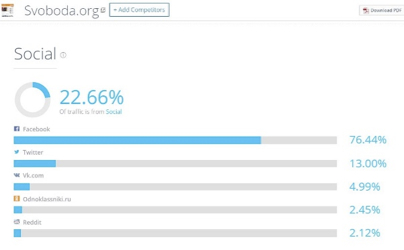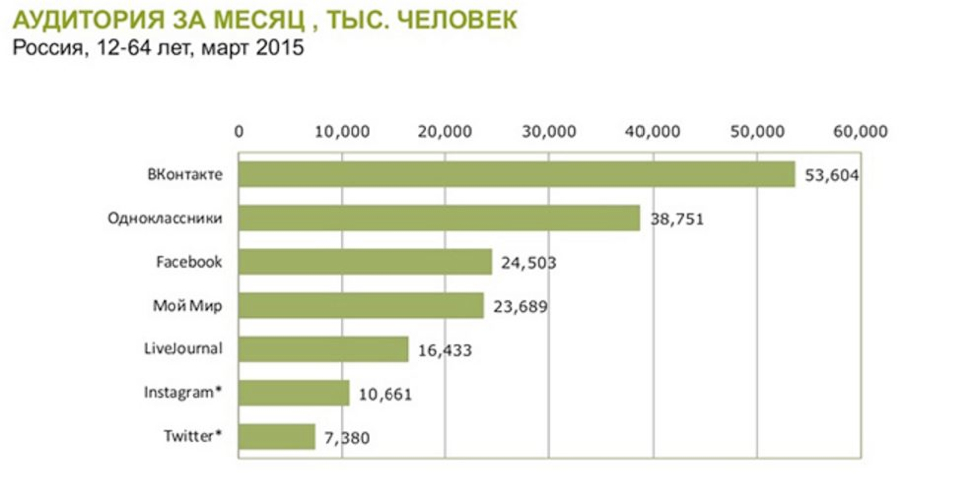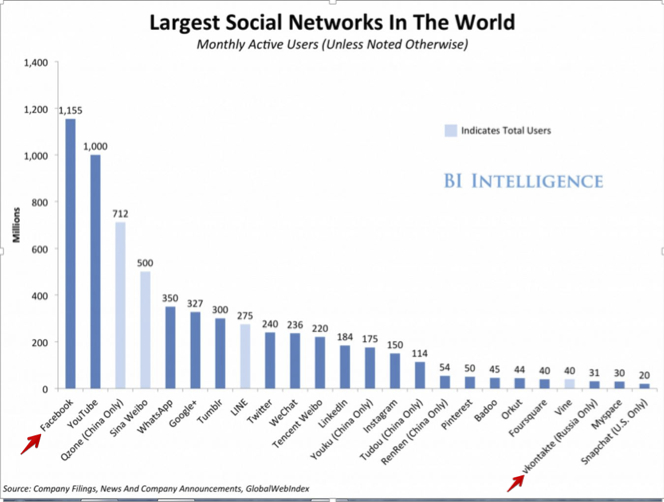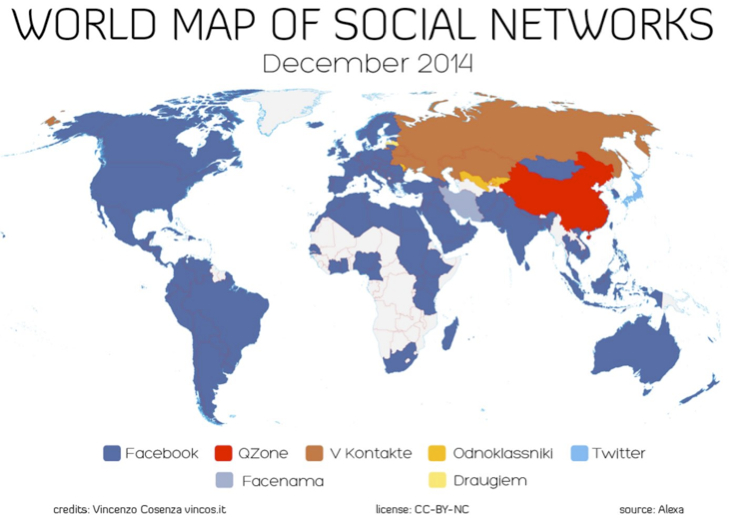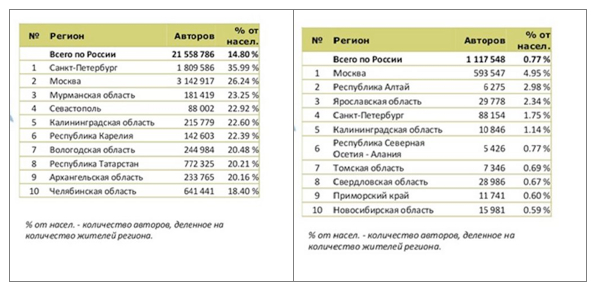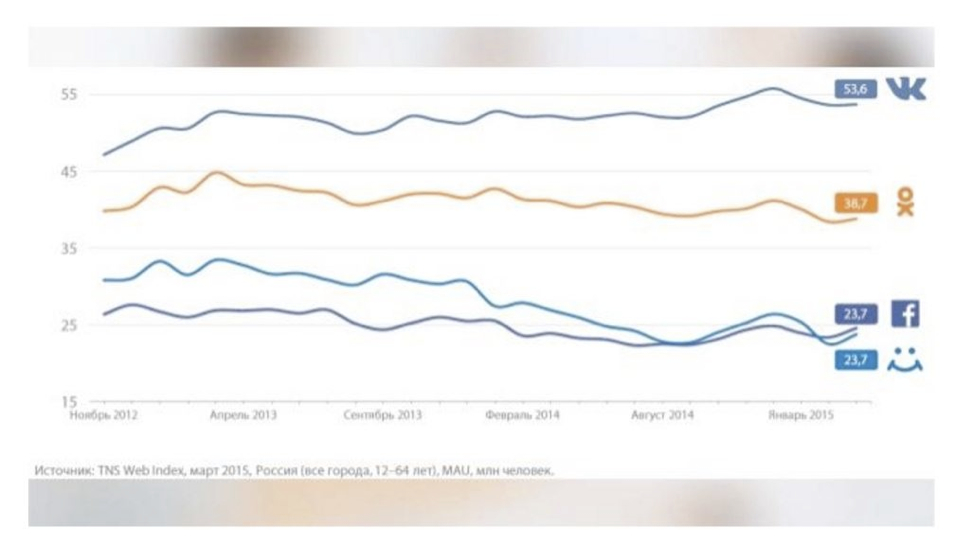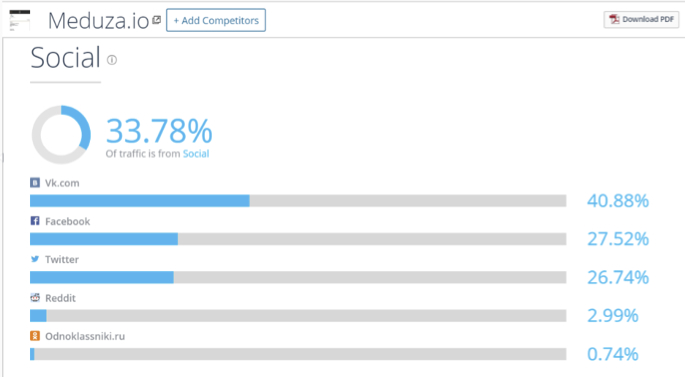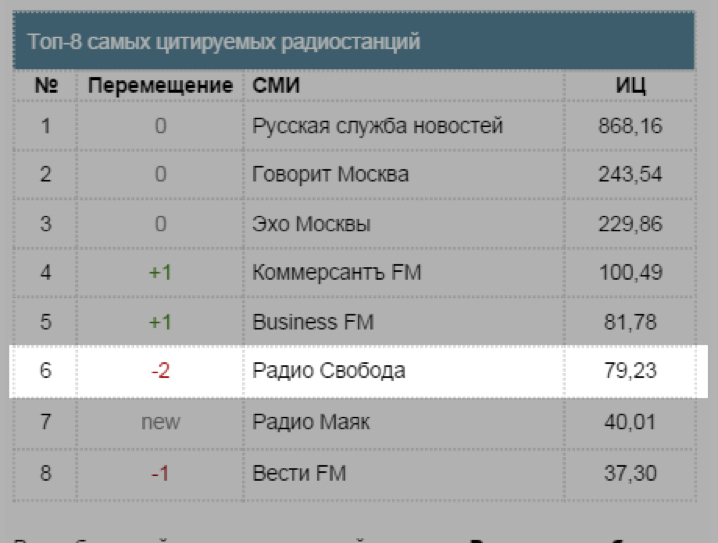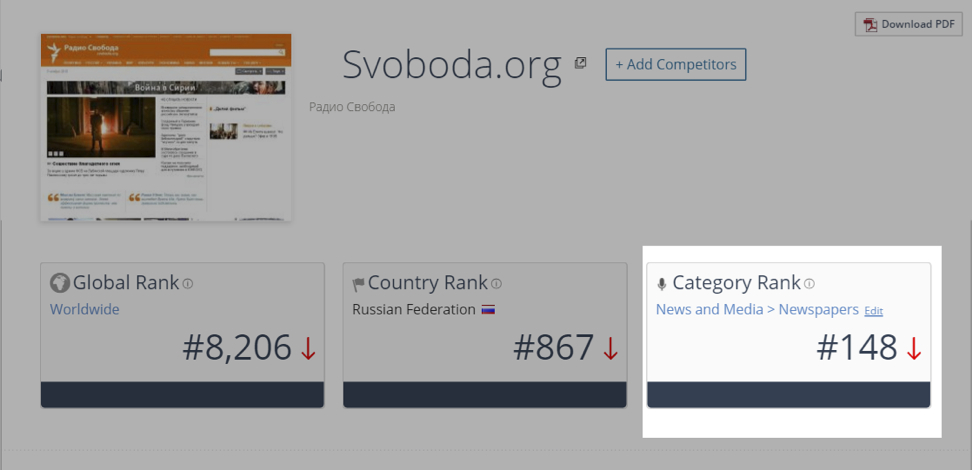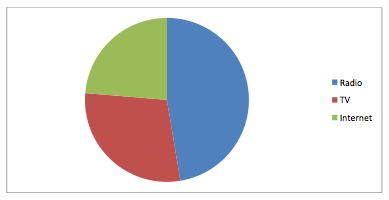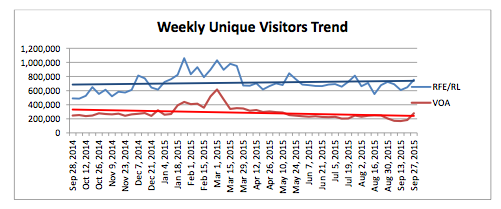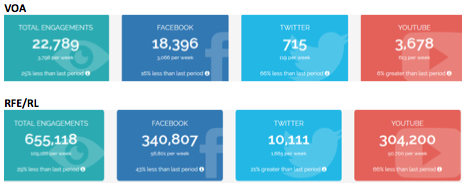BBG Watch EXCLUSIVE
BBG Watch Introduction to “Polemical Remarks About Radio Liberty Russian Service: A View From Russia”
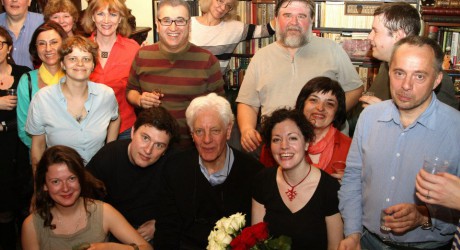
An independent Russian media expert who wants to remain anonymous because he lives in Russia sent us his analysis of how Radio Free Europe / Radio Liberty (RFE/RL) Russian Service is failing to achieve its mission objectives. The author concludes that the Russian Service is not doing well in Russia, especially on social media, and that American taxpayers’ money is being wasted. RFE/RL is funded through annual appropriations from the U.S. Congress and is overseen by the Broadcasting Board of Governors (BBG), both a board and a federal agency in Washington, DC, described in 2013 by Secretary of State and ex officio BBG member Hillary Clinton as “practically defunct.”
In the Russian analyst’s opinion, Russian Service management of Radio Liberty (Radio Svoboda) is “not much interested in Russia” and does not know how to use social media to increase its reach and impact without resorting to tabloid journalism, which the service management is increasingly doing but also without much success in terms of audience engagement. Rather than functioning as a surrogate media outlet, Radio Svoboda appears to the Russian expert to be much more centrally directed from Washington and by the RFE/RL American management in Prague instead of maintaining its own sharp focus on Russia to have a real impact among the Russians on issues central to the station’s pro-democracy mission. According to the Russian analyst, “the journalistic style of RUS2WEB [one of RFE/RLs news websites], which is funded by the American taxpayer, practically did not differ in 2015 from that of the Russian state [news website] ‘Rossiiskaia Gazeta’.” This is a similar “pro-Putin bias” assessment, a different independent Russian media expert provided directly to the BBG at BBG’s request in 2011 about Voice of America Russian Service news website. There has been some improvement in VOA Russian web content since then, but both VOA and now increasingly RFE/RL are still prone to repeating Kremlin disinformation narratives without proper challenge or balance.
Furthermore, according to the Russian analyst, RL’s Russian Service is failing to target the largest segment of the population which remains most vulnerable to “mendacious” Kremlin propaganda. He also argues that RFE/RL is failing to use the right social media platforms in Russia. The author further observes that Radio Liberty has become more of a centrally managed global news service than a provider of surrogate news and opinions that matter the most to the Russians.
The author does not discuss specifically any current management failures and employee morale problems observed by others in Radio Liberty’s Russian Service, but he alludes to Russian Service journalists’ good ideas and initiatives being rejected or ignored by the media outlet’s management.
The Russian analyst strongly suggests that U.S. taxpayers could get much better results for much less money, if RFE/RL were better managed, since similar independent news outlets getting no American investment at all, are doing much better in Russia on the Internet, and specifically in terms of audience engagement on social media platforms. The author points out, for example, that an increasingly successful “Meduza” (Medusa) alternative (surrogate) independent news site in Russia managed by Galina Timchenko, a former chief editor of lenta.ru, which gets no money from the United States, in a very short time has achieved, with a much smaller staff and much smaller budget, a significantly higher web ranking than Radio Liberty’s Russian Service site which has been in existence for many years.
BBG Watch considers this to be a significant analysis by a well-informed and well-meaning Russian expert. It describes accurately the reality of Radio Liberty’s low ranking and impact in Russia in contrast to glowing but largely unconvincing public relations and management self-praising assessments issued by the Broadcasting Board of Governors (BBG) officials, BBG officials use selective statistics but carefully avoid comparisons to the Russian and international competition, thus misleading new BBG CEO John Lansing, BBG Governors, members of Congress, and American taxpayers.
We don’t necessarily agree, however, if that is indeed the author’s conclusion, that Radio Liberty even in its current mismanaged and misdirected state has no real impact and is a complete waste of American taxpayers’ money. That is definitely not the case. But there is no doubt that important mission goals are not achieved and much of the money is being wasted, not by Radio Liberty journalists, but by the Broadcasting Board of Governors bureaucracy and to a lesser extent by the RFE/RL American and Russian Service management in Prague. After the departure of Kevin Klose, the current RFE/RL management in Prague seems incapable of providing leadership and of resisting misguided bureaucratic directives from Washington.
The article was written in Russian and translated into English. When the author wrote that “the Russian Service of RFE/RL’s Radio Liberty is not much interested in Russia,” he may have meant that the Russian Service management, as directed by the American leadership in Prague and in Washington, is not as much interested in Russia or focused on Russia as it should be, because individual Radio Liberty Russian Service reporters certainly are enormously interested in Russia and enormously committed to doing their job well. The author proves this by pointing out that the RFE/RL American and Russian management rejected some of the excellent ideas and initiatives proposed by Radio Liberty journalists.
But there is no doubt whatsoever that RFE/RL Radio Liberty’s Russian Service, poorly directed centrally and poorly managed from within, has low employee morale under its current leadership. It needs major reforms, as does the RFE/RL American management in Prague and the entire Broadcasting Board of Governors (BBG) federal agency in Washington, DC which costs U.S. taxpayers approximately $740 million annually.
For comparison purposes and balance, BBG Watch also includes after the article by the Russian analyst a draft of BBG’s recent analysis of its strategy, role and accomplishments in Russia.
Unlike the analysis sent to us by the independent Russian expert, the BBG analysis is rich on anecdotal evidence but short on comparisons to anything other than between VOA and RFE/RL. For example, the BBG document includes a list of impressive newsmakers and experts who were interviewed, but does not compare the web and social media performance of Radio Liberty and Voice of America to the performance of other alternative web news platforms in Russia, such as “Medusa,” or even to BBC and Deutsche Welle (DW) Russian services.
Reading the BBG document, new BBG CEO John Lansing, BBG Chairman Jeff Shell, BBG board members, Congressmen and American taxpayers would have no real idea how well or how poorly RFE/RL and VOA are doing in terms of impact and audience engagement compared to the internal and international competition. John Lansing and Jeff Shell said recently that while reach is important, what is really important is impact. BBG’s head of audience research resigned last week.
The BBG document displayed at the end of this post does not compare VOA’s and RFE/RL’s rank in weekly unique web visits among all news media outlets in Russia, which is extremely low, especially for VOA’s Russian Service. The Voice of America, however, has a different mission than Radio Liberty–i.e., the VOA Charter mandates that VOA must present and explain U.S. policies and American society. Mixing the two brands together is bad for both, but it is being pushed by the BBG bureaucracy as a way of keeping a lot of officials employed.
What is striking, however, is that even according to the BBG’s own analysis, RFE/RL Radio Liberty’s Russian Service has 3.3 times more weekly unique web visitors than VOA’s Russian Service.
Even more astounding is that Radio Liberty Russian Service while still not doing well at all against Russian state and alternative media outlets on social media has 28.7 times more social media audience engagements than VOA’s Russian Service. BBG officials claim that “recent research indicates growing TV audiences for VOA Russian, mostly from the expansion of [RFE-RL collaborative 30-minute satellite and web TV news program] Current Time.” “The program is, according to May-June 2015 national survey, being watched by nearly two million people weekly online in Russia, with reach highest among Russians age 15-24,” the BBG document states.
Outside observers, however, have little confidence in BBG audience research and how its results are presented. A former BBG Governor and former Radio Liberty executive S. Enders Wimbush told Senate Foreign Relations Committee members in a recent hearing that the RFE/RL response to events in Ukraine has been “feeble.”
According to a high-level former BBG official who wants to remain anonymous, “They [BBG] are about to expand ‘Current Times’ significantly, which is certainly a good idea if the content is well targeted, but this still represents a pitiful response to Ukraine’s unraveling, which began nearly two years ago.” The same former BBG official added “RFE’s Ukrainian service has done better, but the total response—predicated, supposedly, on RFE/RL-VOA cooperation, which is a fiction—is unimpressive, especially given all the new money at their disposal.”
“It would be interesting to find out the true size of the audience of ‘Current Times’ as rebroadcast by TV stations in the newly independent states, but on You Tube, for example, the 28 November program gathered in two days only 403 viewers, [Emphasis added.], the independent Russian analyst observed. Compared to other state and independent sources of news in Russia, audience engagement for RFE/RL, and especially VOA, is extremely low.
These differences between VOA and RFE/RL Russian Services are not surprising to us because VOA is still far more centrally managed by the BBG bureaucracy than RFE/RL. What the BBG analysis calls “USIM (United States Information Media) Coordination” has had a negative impact on RFE/RL. It has been a disaster for all of VOA. The data presented by the Russian analyst show why giving even more power to BBG bureaucrats in Washington would be an even greater disaster.
Reform of the Broadcasting Board of Governors, the Radio Free Europe / Radio Liberty American leadership in Prague and management teams of both VOA and RFE/RL Russian services is urgently needed to make better use of U.S. taxpayers’ money. Radio Liberty must be able to offer content in response to–in the words of the Russian expert, “the current Kremlin policies, which are based on big lies“–that could effectively enlighten and influence Russian public opinion. Pointing out the level of “the support that the majority of Russians grant to the current Kremlin policies,” the independent Russian expert concludes that in this respect Radio Liberty is not doing well in Russia at all.
A View From Russia

Polemical Remarks About Radio Liberty
By An Independent Russian Analyst
The mission of Radio Liberty’s Russian Service is to deliver accurate and balanced information to the citizens of Russia in a situation where the Russian media for obvious reasons do not keep up with those standards. Radio Liberty (known in Russian as Radio Svoboda) is part of Radio Free Europe / Radio Liberty (RFE/RL) which is overseen by the Broadcasting Board of Governors (BBG) in Washington, D.C. and funded by U.S. taxpayers through annual appropriations from the U.S. Congress.
How does the Russian Service cope with the task of delivering accurate and balanced information to Russia?
Judging from the support that the majority of Russians grant to the current Kremlin policies, which are based on big lies, Radio Liberty is not doing well in Russia. Thus American taxpayers’ money is being spent in vain.
One could counter that under current conditions to accomplish these tasks is very difficult: dozens of regional radios stopped rebroadcasting RL’s Russian Service programs under the authorities’ pressure, RL also lost its frequencies on medium waves in Moscow and Saint Petersburg, in 2016 broadcasting on short waves may be discontinued. This means that the only way the Russian Service can deliver information is through its own web site and social networks.
True. The situation is exactly as described above which means that the Russian Service should reorganize its work according to the new conditions. Is Radio Liberty doing this? Did it at least develop a concept for such a reorganization? Did it find a way to deliver information to the audience which relies for news on Russian state TV networks?
Alas, a comprehensive concept to meet the challenges ahead does not exist at Radio Liberty’s Russian Service and at RFE-RL. We can only see a few projects, an illusion of intense activity coming from both the Russian Service management and the RFE-RL upper management in Prague.
As a rule, these projects follow the fashionable trends of the new media in a rapidly changing world. A few years ago, the leading motto of RFE-RL was “convergence.” Everyone was saying that RFE-RL needs multimedia articles, that it needs multi-skilled journalists able to write a text, produce a video with their smart phone, edit a picture, and incorporate a video and audio clip into their text. As a result almost all articles in the web site became multimedia.
But did this bring an explosive increase in traffic? Alas, it didn’t!
Then it was decided that “convergence” was not sufficient, it was becoming outdated, and the new challenge was to develop Internet TV as a new way to reach out to a larger audience. A well known expert was invited to the Russian Service. For a few days the whole service was listening to him and for another few days they discussed together in detail how to implement such a TV project in practice. As it turned out the project to be implemented required a lot of money and specialists. In the end the TV fever faded out and everything remained as it was: 2-3 one-hour-long live or recorded TV chats with talking heads.
However, even before the Ukrainian events, enterprising employees understood that short TV news produced by RL could stand out in front of the mendacious programs of Russian state TV, and could even attract a larger audience. They recorded a couple of pilot programs which were not approved. Their enthusiasm soon cooled down.
For their part, RFE-RL upper management in Prague suddenly became active. They came out with a global TV news project called “The World Though The Eyes of Radio Liberty.” For this project a raw video on current events was urgently requested from each of various RFE-RL language services. Those videos were edited, voiced over in different languages and distributed among services. To say the truth, some employees had reservations about this cumbersome undertaking for they thought that their language service did not need TV news from all corners of the world, but rather news about their particular target country. However RFE-RL top management in Prague insisted in pursuing this sort of “CNN surrogate project” under their own leadership. The reasons were understandable: financial resources could be retained by the center rather then being distributed to the services, which allowed RFE-RL management to increase the staff of central departments.
This is exactly what happened in a very short time. The mantra was that Russian propaganda in the former republics of the USSR needed to be countered. Thus a TV program in Russian called “Current Times” was launched and distributed to partners for rebroadcasting in the newly independent states. As it was stated, the daily half-hour-long TV program was the result of a cooperative project between RFE-RL and the Voice of America (VOA). However, for unknown reasons, the Russian Service of Radio Liberty had not been involved in the project. The quality of the program was sharply criticized by experts almost immediately.
It would be interesting to find out the true size of the audience of “Current Times” as rebroadcast by TV stations in the newly independent states, but on You Tube, for example, the 28 November program gathered in two days only 403 viewers.
Staff expansion did not stop after the project was launched. Sometime later a Russian language site-aggregator was created, RUS2WEB, presented as a platform for civil journalism. Reportedly this site is oriented to a younger audience and this is why apparently it painstakingly copies the fashionable design of medusa.io, an increasingly successful site managed by Galina Timchenko, a former chief editor of lenta.ru. However the journalistic style of RUS2WEB, which is funded by the American taxpayer, practically does not differ from that of the Russian state Rossiiskaia Gazeta.
Here is an example:
“RUSSIA DEALT A BLOW TO THE ISLAMIC STATE WITH CRUISE MISSILES
2 hours ago – 39 visitors
The Russian submarine ‘Rostov-na-Donu,’ which is on the Mediterranean, bombed with cruise missiles the capital of the ‘Islamic State’ (this organization is forbidden in Russia), the Syrian city of Raqqa. Currently the results of this strike are being analyzed with the use of air and space means of exploration.
According to the speaker of the Ministry of Defence, the strike was launched following an order by President Putin concerning the intensification of strikes against terrorists in connection with their involvement in the crash of the Russian A321 airplane in Egypt. Training camps, the general quarter, storages of weapons and ammunitions as well as dislocations points of the guerrillas became the targets of the strikes. Russia dealt a blow to the Islamic state with cruise missiles.
Previously Vladimir Putin had instructed the intelligence agencies to identify those responsible for the terrorist attack on board a of A321 and ‘to eliminate all those people.’ ‘I stress once more: the President instructed our intelligence services to take measures in order to identify all those who were involved in the organization of this monstrous act of terrorism. He instructed them to search for them all over the world without any limitation in time, and eliminate all those people’ – said the president’s speaker Dmitrii Perskov.”
Since we already mentioned “Medusa”, it would be interesting to compare on alexa.com the global ratings of this site, which was started only one year ago, with the ratings of the Radio Svoboda site, which has been in place for many years.
We can see that the Medusa site is ahead of Radio Svoboda while we know that the staff of Medusa consists of about two dozens of people. In addition Medusa has no video at all, while the management of RFE-RL expects a dramatic increase in audience by the incorporation of video clips.
WHAT ARE WE BROADCASTING ABOUT?
All of these Russian language resources under the label of RFE-RL cover… the same topics that are covered by other more or less self-respecting Russian media. This proverbial “agenda” is so much the same for everybody that all the media seem to be guided only by the principle: “a step aside is equal to a catastrophic fall in visitors.” Traffic, i.e. the number of clicks and “Likes”, appears to be now the main goal of each media company, including RFE-RL projects. It is quite evident that topics are selected based on their popularity on social networks. And it goes by itself that the topics dictated by the audience of social networks are becoming more and more similar to the favorite stories one can find in tabloids. (Which at Radio Liberty are, for example, the series about the secret daughter of Putin, the jewels of the Russian officials and the Milonov calendar.)
TO WHOM ARE WE BROADCASTING?
Let’s take a closer look at the audience which today practically determines the editorial policy of the Russian Service. Approximately 23% of the referrers to Svoboda come from social networks, while on RUS2WEB those referrers are 63%. On Svoboda the majority of referrers come from Facebook as shown by similarweb.com
The graphic shows that more than 76% of the traffic from social networks on Svoboda comes from Facebook, which is 17% of the overall traffic. However, it is exactly those 17% that determine the choice of subjects by the Russian Service. When at the editorial meetings one hears that “they are not going to read this” this means that the suggested topic is not liked by the Russian Facebook community.
Now let’s look at the place that Facebook occupies among the Russian social media.
Here is a research conducted by Brand Analytics for the first semester of 2015:
We can see that the overall monthly audience of the specifically “Russian people’s networks” (VKontakte, Odnoklassniki and Moi Mir) consists of approximately 116 million people, which means that it is five times higher than the monthly audience of Facebook in Russia. In the rest of the world Russian networks are negligible compared to Facebook. As shown below, in the world Vkontakte ranks #31.
But in Russia VKontakte is first:
Now let’s compare the activity of VKontakte and Facebook authors in Russia (brand Analytics from left to right):
We can see that the VKontakte authors’ activity is much higher than that of Facebook authors while in the first ten regions the percentage of authors is approximately the same.
Thus the most active users of social networks in Russia are to be found on Vkontkte but on this social network the traffic directed to Radio Svoboda is only 5%. Even adding the traffic from Odnoklassiki the sum would be about 8% while the traffic to Radio Svoboda Russian Service from Facebook is 76%.
The question is why Radio Svoboda is oriented to the minority among Russian visitors of social networks rather than to the majority? It would be more logical to turn to the majority of the population which is currently being deceived by the government’s propaganda rather than to the users of Facebook who in their majority know without Svoboda where to look for reliable information.
Interestingly, on Medusa, which gets from social networks almost 34% of its traffic, VKontakte is on the first place:
And while the chief editor of Medusa Galina Timchenko says that the number of “Likes” is not the most important thing, the management of the RL Russian service still gets excited at any new round number of “Likes” on the Svoboda Facebook page or about the “high” citation number of Svoboda among the radios, although according to Medialogia, that number for October 20015 is 10 times lower that that of the pro-Kremlin Russian News Service (http://www.mlg.ru/ratings/federal_media/):
This is a rather strange rating for in this case Radio Svoboda is still considered a broadcaster while RS strictly speaking has not been a radio for a long time, but a multimedia company mainly focused on its web site. So let’s ask which is the place of svoboda.org among the Russian Internet resources? The answer is: according to “Similar Web” RS is not among the first 50 Internet resources (http://www.similarweb.com/country_category/russian_federation/news_and_media). RS is not even among the first 100:
CONCLUSION
What’s the reason? I think that the Russian Service of RFE/RL’s Radio Liberty is not much interested in Russia. Evidently the Russian Service management believes that Radio Svoboda is not a Russian language multimedia company focused on Russia and targeting Russia, but more of a global news service. The editorial policy is being designed accordingly. Why should we expect then from RFE/RL’s Radio Liberty to fulfill its mission in Russia?
###
A View From Broadcasting Board of Governors
DRAFT
Broadcasting Board of Governors
International Broadcasting Bureau Office of Performance Review
Russia
FY2015 USIM STRATEGY FINAL NARRATIVE
Strategic Audience
VOA targets 18-45 year-old, Russian-speaking, digital media users working in the global economy that are college-educated, urban, and curious about the West, and U.S.-Russia relations; as well as 20-54 year-olds who are primarily college-educated, urban, interested in business and finance news and analysis, and actively seeking U.S. and international perspectives on major political and economic developments relevant to Russia.
RFE/RL Svoboda’s target audience consists of active, digital consumers of all ages, but with a focus on 20-45 year olds, generally well educated and urban. Many but not all are strongly opposed to the current political regime; all are open to information that offers a different perspective on a wide range of political, social, civic, cultural and human rights issues that are not reported by other media and are – or have the potential to be – change agents.
Accomplishments/Impact
USIM Coordination: VOA and RFE/RL Russian services exemplify successful cooperation and collaboration between USIM networks to the benefit of audiences they serve. In addition to the television co-production Current Time, VOA and RFE/RL Russian services exchange digital content in order to amplify the impact of their reporting efforts. They provided highly regarded complementary coverage following the murder of opposition leader Boris Nemtsov, and conducted a joint interview with a leading anti-corruption activist Alexei Navalny.
Following Russia’s annexation of Crimea and increasing spread of disinformation, VOA Russian dropped its initial FY15 targets to pivot and fully support the new daily television co-production with RFE/RL, Current Time, which is carried by affiliate channels in Georgia, Latvia, Lithuania, Moldova, and Ukraine, and is available to Russian speakers everywhere on digital platforms. RFE/RL added a Current Time Asia edition in September 2015, bringing the program to Russian speakers in Kazakhstan, Kyrgyzstan, and Tajikistan.
Over the past year, VOA Russian produced interviews with key U.S. officials including Secretary of State John Kerry and Assistant Secretary for Europe and Eurasia Victoria Nuland; many U.S. lawmakers including Senators John McCain and Lindsey Graham, and Representatives Ed Royce, Eliot Engel, and Ileana Ros-Lehtinen; along with former diplomats Strobe Talbott, Thomas Pickering, Zbigniew Brzezinski, and Henry Kissinger.
Top Ukrainian officials, including Prime Minister Arseniy Yatsenyuk, had a chance to address Russian speaking audience via VOA, which also hosted interviews with Baltic leaders such as Estonian President Toomas Hendrik Ilves and Lithuanian Foreign Minister Linas Linkevicius. Key Russian opponents of Vladimir Putin came to VOA to speak out against his expansionist policies- among them Mikhail Khodorkovsky, Mikhail Kasyanov, the late Boris Nemtsov, Alexy Navalny and other journalists, human rights activists and social media influencers.
VOA Russian’s live social media coverage of Boston bomber Dzhokhar Tsarnaev’s trial in March- April 2015 exemplified VOA’s contribution to drive news and influence media organizations in the target area. Ekho Moskvy (Echo of Moscow), one of the few remaining independent media outlets in Russia, relied solely on original reporting by Fatima Tlisova, which was also highlighted and cited in a number of major American media outlets. Ekho Moskvy Editor-in- Chief Alexei Venediktov openly praised Tlisova’s reporting as an example of “journalistic professionalism he had not seen before” – and asked his staff during an editorial meeting “to model their courtroom reporting on VOA’s coverage from Boston.” Tlisova was one of the three journalists invited to the White House to speak about free press with President Obama on World Press Freedom Day.
Developments/Challenges
2015 Freedom House Press Freedom Score: 6.0 (Not Free)
2015 Reporters without Borders Ranking: #152 out of 180 countries
Percentage of Population with Favorable View of US: 15% in 2015, down from 23% in 2014, while the Unfavorable category increased from 71% in 2014 to 81% in 2015. (Source: Pew Research Center)
Russia maintains full control over its media, with zero tolerance towards any criticism and opposition voices. The government has also increased arrests of bloggers and online news reporters. Authorities use extreme strategies and punishment to intimidate and kill journalists and politicians who are critical of its policies. Top examples are the murder of Boris Nemsov (who voiced opposition against invasion of Ukraine) and multiple arrests of blogger Alexei Navalny.
This year marks further slide in press freedom, resulting in rating change by Freedom House. Russia’s civil liberties rating declined from 5 to 6 due to expanded media controls, a dramatically increased level of propaganda on state-controlled television, and new restrictions on the ability of some citizens to travel abroad.
Research Update
Recent research indicates growing TV audiences for VOA Russian, mostly from the expansion of Current Time. The program is, according to May-June 2015 national survey, being watched by nearly two million people weekly online in Russia, with reach highest among Russians age 15- 24. The VOA Russian Service’s website has been the biggest traffic referrer to the Current Time’s digital content after VKontakte, Facebook and Google. Furthermore, available data from Lithuania show that during June 2015, on average 8.5 percent of adults (15+) in TV households watched the program on affiliated “Info TV” weekly; and in Estonia, where Current Time was not yet on the air, in August 2015 USIM Russian-language content reached 5.2 percent of adults weekly. There is encouraging news from Ukraine, by far the largest Russian-speaking media market outside of Russia – with top rated television networks competing for the prime time broadcast rights for Current Time.
USIM Audience by Platform in Russia
(Does not reflect shared audience among platforms)
Digital Trend
Average Weekly Visits for VOA Russian in FY15 was 442,692 and for RFE/RL Russian was 1,470,019, as measured through FY15 using Adobe Analytics, which does not count social media, syndication and other digital distribution. Spikes in traffic in February were linked to opposition protests against Ukraine invasion and culminate in the week after the assassination of prominent opposition leader Boris Nemtsov.
Social Media Engagement
(Sample only from 9/20/2015 through 10/31/2015. RFE/RL was not included in Dashboard for most of FY15.)

